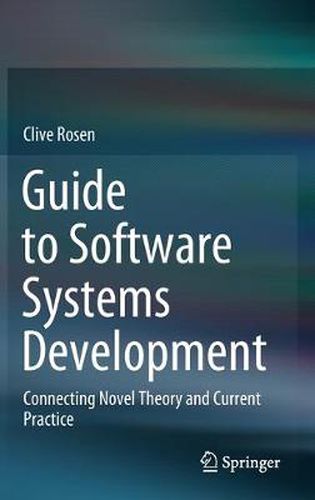Readings Newsletter
Become a Readings Member to make your shopping experience even easier.
Sign in or sign up for free!
You’re not far away from qualifying for FREE standard shipping within Australia
You’ve qualified for FREE standard shipping within Australia
The cart is loading…






This title is printed to order. This book may have been self-published. If so, we cannot guarantee the quality of the content. In the main most books will have gone through the editing process however some may not. We therefore suggest that you be aware of this before ordering this book. If in doubt check either the author or publisher’s details as we are unable to accept any returns unless they are faulty. Please contact us if you have any questions.
This book argues that the key problems of software systems development (SSD) are socio-technical rather than purely technical in nature. Software systems are unique. They are the only human artefacts that are both intangible and determinant. This presents unprecedented problems for the development process both in determining what is required and how it is developed. Primarily this is a problem of communications between stakeholders and developers, and of communications within the development team. Current solutions are not only inadequate in expressing the technical problem, they also evade the communications problems almost entirely.
Whilst the book addresses the theoretical aspects of the process, its fundamental philosophy is anchored in the practical problems of everyday software development. It therefore offers both a better understanding of the problems of SSD and practical suggestions of how to deal with those problems. It is intended as a guide for practising IT project managers, particularly those who are relatively new to the position or do not have a strong IT development background. The book will also benefit students in computing and computer-related disciplines who need to know how to develop high quality systems.
Software systems development (particularly of large projects) has a notoriously poor track record of delivering projects on time, on budget, and of meeting user needs. Proponents of software engineering suggest that this is because too few project managers actually comply with the disciplines demanded of the process. It is time to ask the question, if this is the case, why might this be? Perhaps instead, it is not the project managers who are wrong, but the definition of the process. The new understanding of the SSD presented here offers alternative models that can help project managers address the difficulties they face and better achieve the targets they are set.
This book argues that time is up for the software engineering paradigm of SSD and that it should be replaced with a socio-technical paradigm based on open systems thinking.
$9.00 standard shipping within Australia
FREE standard shipping within Australia for orders over $100.00
Express & International shipping calculated at checkout
This title is printed to order. This book may have been self-published. If so, we cannot guarantee the quality of the content. In the main most books will have gone through the editing process however some may not. We therefore suggest that you be aware of this before ordering this book. If in doubt check either the author or publisher’s details as we are unable to accept any returns unless they are faulty. Please contact us if you have any questions.
This book argues that the key problems of software systems development (SSD) are socio-technical rather than purely technical in nature. Software systems are unique. They are the only human artefacts that are both intangible and determinant. This presents unprecedented problems for the development process both in determining what is required and how it is developed. Primarily this is a problem of communications between stakeholders and developers, and of communications within the development team. Current solutions are not only inadequate in expressing the technical problem, they also evade the communications problems almost entirely.
Whilst the book addresses the theoretical aspects of the process, its fundamental philosophy is anchored in the practical problems of everyday software development. It therefore offers both a better understanding of the problems of SSD and practical suggestions of how to deal with those problems. It is intended as a guide for practising IT project managers, particularly those who are relatively new to the position or do not have a strong IT development background. The book will also benefit students in computing and computer-related disciplines who need to know how to develop high quality systems.
Software systems development (particularly of large projects) has a notoriously poor track record of delivering projects on time, on budget, and of meeting user needs. Proponents of software engineering suggest that this is because too few project managers actually comply with the disciplines demanded of the process. It is time to ask the question, if this is the case, why might this be? Perhaps instead, it is not the project managers who are wrong, but the definition of the process. The new understanding of the SSD presented here offers alternative models that can help project managers address the difficulties they face and better achieve the targets they are set.
This book argues that time is up for the software engineering paradigm of SSD and that it should be replaced with a socio-technical paradigm based on open systems thinking.